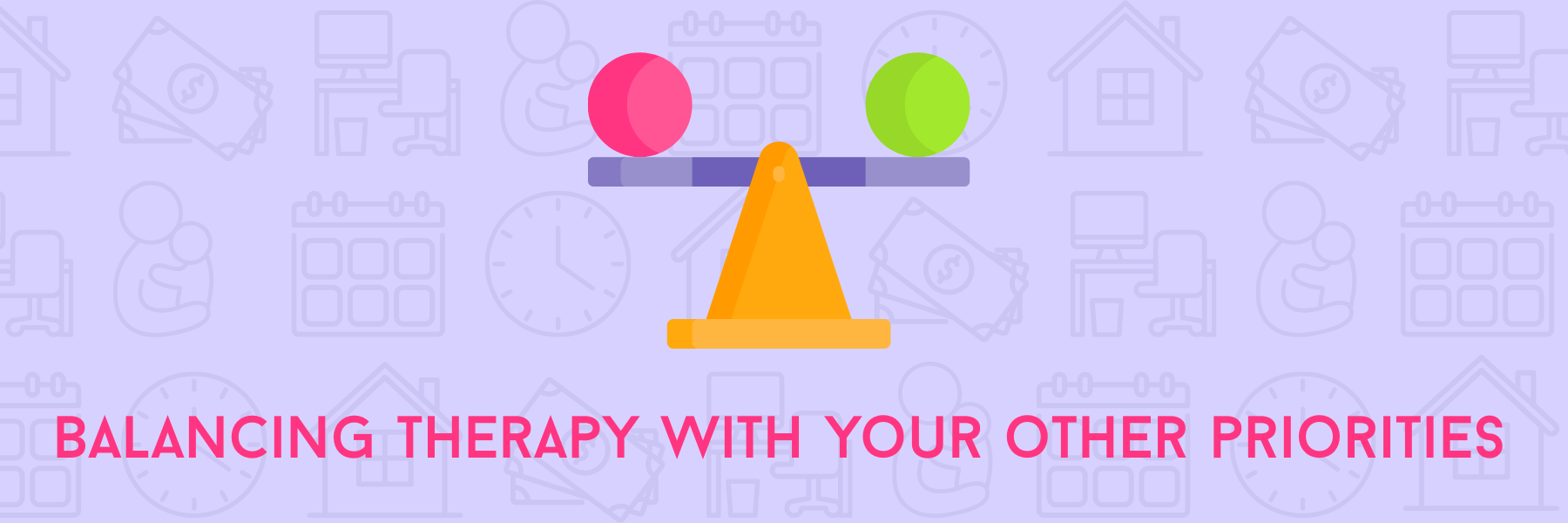
Life is full of pressures.
Life with a special needs child is double (or triple) as full.
As you watch your child grow up, struggling all the while to acquire the skills which their neurotypical peers seem to absorb naturally, it’s normal – so, so normal – for undercurrents of panic to set in.
Panic has a way of galvanizing us into action. We want to do everything in our power to help our children be their best selves; we’re ready to invest as much as it takes. It’s tempting to squeeze more therapy into empty spaces. New, up-and-coming interventions look so attractive.
But before sinking all that time, money, and — most importantly — emotional energy into this, let’s take a step back and ask ourselves an honest question:
What are we achieving?

Mommy First
The FIRST thing to think about when considering additional therapy is how YOU will be able to integrate it comfortably into your existing schedule.
If there’s one point to take away from this, it’s that your kid picks up on your feelings.
If maintaining a rigorous and demanding therapy schedule for your child is burning you out, the first person who’ll get affected is… your child.
So that’s it? Just stop any extra therapy, cold-turkey?
We didn’t say that.
You and your child have unique life circumstances and there’s no one-size-fits-all approach here.
The first step is honesty.
Take an objective look at your personal schedule, your emotional energy levels, and your family circumstances, and make a decision which doesn’t put a strain on the most important stuff.
(And yeah, avoiding being a burned out parent is totally in the most-important-stuff category.)
Of course, if all you need is a bit of self-care to get back onto track, be it an early morning coffee or a chapter in an old, favorite book, go for it!
But if those extra therapy sessions are taking more out of you than they should be, it may be time to reconsider.

Follow the leader
Keeping on top of your child’s therapists is a full-time job.
When your child has an OT, PT, speech therapist, and special ed teacher, each working with him or her separately, there are often gaps in communication between all of the adults who are trying to help your child.
All of the providers — and most importantly, your child — can benefit from working together, but practically speaking, this essential teamwork is sometimes overlooked, which is a shame.
Okay, but what can I do about it?
The answer is laughably simple: pick one person on your child’s team, preferably the most experienced therapist, and make them the leader. The leader would network with all of the therapists, checking in on your child’s progress in each area and helping everyone plan their sessions in a way which complements the other therapists’ work.

Make a game plan
What’s the goal?
When pursuing therapy for a child with special needs, you gotta have a goal. Those goals can be bite-sized, but label them anyway. Study your child, note which areas he or she is struggling in most, and think about what level of improvement may be possible with some focused intervention. Until you know what it is that you’re working towards, it’ll be really tough to measure progress.
Get in touch right at the beginning of the school year with your child’s school therapists. Make it easy for them to keep you in the loop by telling them how to reach you best, whether it’s by phone, texting, or sending a notebook back and forth in your child’s backpack.
If you want to maximize the therapy your child is already receiving in school, ask the therapists to give some light homework assignments for you to do with your child at home, tweaking it every 3-4 weeks as your child progresses further. Find natural ways at home, at the table, and in the playground to implement the skills your child is working on in therapy.
Though each child has different needs, for many children (and many parents), putting in a little extra at home can preclude the need to schlep to exhausting additional private therapy sessions outside of school.

Points to consider
All of the above being said, you may see that your child’s needs are not being met by the therapy provided at school.
If you do decide to get your child some extra therapy, here are a few key pointers:
👉 Make sure you aren’t wasting time. The new therapist should work together with existing therapists. Additional therapy should either fill gaps or enhance existing skills. Too often, energy, time, and money are wasted because two therapists are working with the same child, with different goals in mind.
👉 Be present. Don’t forget Rule #1: your child feeds off of your feelings. If the extra therapy is wearing you out, be realistic about what session length you can handle and how far you are able to schlep, and plan these additional sessions accordingly.
👉 Keep on top of progress. Set a realistic goal and see how things develop. You want to have seen some measure of improvement within 4-6 weeks.
👉 How is your child handling the extra sessions? Therapy is lots of hard work for your kid. If you see that it’s too much, consider asking the therapist if you could take a break for a few weeks; the last thing your child needs is to get burned out. (And by the way, studies show that taking a break in therapy can actually be beneficial in your child’s progress.)
👉 Handling resistance: Going to additional therapy sessions after school is not every kids’ idea of fun, and you may find yourself dealing with your child’s tantrums, tears, and frustration. As your child gets older, it can get even harder. Your best bet is to include your child (at their level, of course) by explaining what’s going on, giving them some level of control over the therapy plan, session time, etc., and offering valuable rewards for cooperation.

Enough is enough
Sometimes you’ll bring your child to a therapist, a top one, someone you waited months to see for a consultation, and they’ll prescribe just one simple-looking exercise to do with your child.
When it comes to therapeutic interventions, smarter is better than more. Do the exercise religiously for a few weeks, and you will likely be surprised at the tangible results.
Sometimes your sister-in-law’s neighbor’s cousin tells you about an interesting therapy which is guaranteed to show quick results for children with your child’s symptoms or challenges.
Do research. Call the practitioner up and ask specific questions about how this approach works and how it would help your child. Bear in mind that sometimes, a “quick fix” means the root of the problem wasn’t addressed, and the same problem may very well pop out in a new form next week. Be wary of approaches that claim to helpful for all children, of all ages, with any diagnoses.
Sometimes your child’s school will tell you that your child can use more therapy then they are able to provide in school.
Prioritize. Ask them which type of therapy your child needs MOST to succeed in school. The staff at school see your child daily in an educational environment and they have valuable insight as to what you should choose to focus on.
Sometimes a proven intervention is provided to your child by a reputable therapist, but you’re still not seeing any progress.
The right intervention works best when given at the right time. An intervention that may work wonders in the future can produce poor results if your child is not yet developmentally ready for it, and vice versa, an intervention which worked well until now might plateau as your child grows, and it may be time to look for something new to support his or her next stage of development.

You got this!
The world of therapy is an overwhelming one.
Thankfully, our job in this world isn’t to fix all of the problems, but to do our minimum hishtadlus. Give yourself and your child the time and space needed to acclimate to the new therapists and therapy schedule this school year before making any major decisions.
Still overwhelmed? Feel free to reach out to Ezreinu for guidance at 718-750-1010.
Wishing all of our Ezreinu families a smooth transition to the new school year!
With much appreciation to the following therapists who generously shared their expertise with us for this newsletter:
Fraida Flaishman, PhD OTR/L
Occupational Therapy Consultation, Supervision, Staff Training
917-557-4814
Amy (Friedy) and Evelyn (Roizy) Guttmann
718-621-3385

Suri, a sweet 6-year-old with multiple disabilities, had happily attended a local Sunday program last year. At the end of the summer, Suri’s mother got a call from the Sunday program that they would no longer be able to provide the level of support that Suri needed. At a loss, she reached out to Ezreinu and was referred to a different excellent local Sunday program which would be able to accommodate Suri’s needs without a problem.⬛
Mr. Grossman was struggling to figure out which services his child was eligible for. His child’s school had told him one thing while the agency claimed something else, and he was starting to get frustrated with all the contradictory information. He called Ezreinu and received clear guidance regarding which services his child was indeed eligible for and instructions for how to go about process of enrolling in those services.⬛
Identifying details have been changed to protect client confidentiality.
